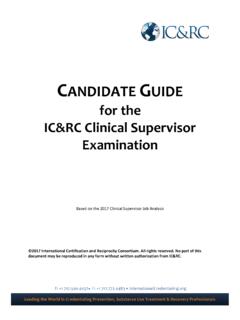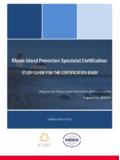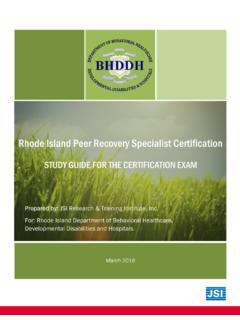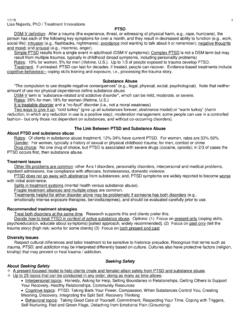Transcription of STUDY GUIDE FOR THE CERTIFICATION EXAM
1 Earlier draft. Updated Winter 2015 Rhode Island Prevention Specialist CERTIFICATION : STUDY GUIDE FOR THE CERTIFICATION EXAM Prepared by: Rhode Island Prevention Resource Center Prepared for: BHDDH Updated 12/17/2015 ACKNOWLEDGEMENTS & FUNDING STATEMENT The Rhode Island Prevention CERTIFICATION GUIDE : A STUDY GUIDE for the CERTIFICATION Exam is a resource sponsored by the Department of Behavioral Healthcare, Developmental Disabilities and Hospitals (BHDDH) to serve as a STUDY aid to assist prevention professionals to prepare for and pass the Rhode Island Prevention Specialist CERTIFICATION Exam. The GUIDE was developed by the RI Prevention Resource Center (RIPRC). The RIPRC is implemented by JSI Research & Training Institute, Inc.
2 Under contract with the BHDDH. All or part of the funding for the contract is provided by the substance abuse and Mental Health Services Administration (SAMHSA). The content of this GUIDE does not necessarily represent the views or policies of either SAMHSA or the BHDDH. Updated 12/17/2015 TABLE OF CONTENTS Introduction And Purpose .. 3 Public Health Approaches To Prevention In Behavioral Health .. 5 Prevention Theories And Strategies .. 10 Strategic Planning For Prevention .. 15 Cultural Competence In Prevention .. 27 Coalition Development .. 32 Communication Strategies .. 38 ATOD Effects Of Drugs On The Brain .. 42 Ethical Issues In Prevention .. 45 Preparing For The Exam .. 48 Sample Exam Practice Materials .. 51 Sample Exam Questions.
3 52 Practice Activity: Process Or Outcome Evaluation? .. 69 Practice Activity: U, S, Or I? .. 70 Flashcards .. 71 Reference Materials .. 79 Acronyms .. 80 Acronyms (Rhode Island-Specific) .. 81 Glossary .. 82 Examination Reference List .. 92 Updated 12/17/2015 RI Prevention Specialist CERTIFICATION Exam STUDY GUIDE | Page 3 INTRODUCTION AND PURPOSE Introduction A prevention specialist is a behavioral health professional who has demonstrated competency related to alcohol, tobacco and drug use prevention, and who provides services that help individuals, families and communities to develop the capacities needed to achieve behavioral health and wellness. Prevention specialists deliver evidence-based prevention programming in a wide range of settings including schools, workplaces, health care centers, behavioral health programs, community based organizations, and prevention coalitions.
4 The RI Department of Behavioral Healthcare, Developmental Disabilities and Hospitals (BHDDH) is committed to building and strengthening the prevention workforce in Rhode Island, by supporting training and professional development opportunities, and facilitating the CERTIFICATION process for both beginning and experienced prevention professionals. Toward that end, BHDDH commissioned the development of this STUDY GUIDE for individuals seeking to take the Prevention Specialist CERTIFICATION Exam offered by the Rhode Island CERTIFICATION Board. Purpose of the GUIDE : This GUIDE was designed as a STUDY aid to help prevention professionals prepare for and pass the Rhode Island Prevention Specialist CERTIFICATION Exam. The content of the GUIDE is based on the knowledge, skills and job tasks derived from the 2013 Prevention Specialist Job Analysis conducted by the International CERTIFICATION and Reciprocity Consortium (IC&RC) which sets standards and develops examinations for the credentialing of prevention, substance use treatment, and recovery professionals.
5 The GUIDE was developed by the Rhode Island Prevention Resource Center (RIPRC), in consultation with subject matter experts in the prevention field, with input from prevention specialist candidates who have taken or are preparing to take the CERTIFICATION exam. Overview of the GUIDE : The first half of the STUDY GUIDE summarizes key concepts and strategies so that users can review content areas essential to prevention practice, including: public health approaches to prevention in behavioral health prevention theories and strategies strategic planning for prevention cultural competence in prevention coalition development communication strategies ATOD-Effects of drugs on the brain ethical issues in prevention Updated 12/17/2015 RI Prevention Specialist CERTIFICATION Exam STUDY GUIDE | Page 4 The remainder of the GUIDE is comprised of practice activities including over 50 sample questions similar in format and level of difficulty to those on the exam, along with an answer key and explanations of the correct responses.
6 Two worksheets and a set of flashcards for STUDY -on-the-go are also included, along with an extensive glossary, a list of acronyms, and references to consult for more in-depth review of important topics. STUDY tips and test-taking strategies are also provided. For More Information: For information on Prevention Specialist CERTIFICATION in Rhode Island, please contact the Rhode Island CERTIFICATION Board (RICB): 401-349-3822, For information on scheduled workshops on preparing for the CERTIFICATION exam, please contact the Rhode Island Prevention Resource Center: For information about the exam itself, please consult the Candidate GUIDE for the IC&RC Prevention Specialist Examination: 0guide% For information about the behavioral healthcare system in Rhode Island, please contact the Rhode Island Department of Behavioral Healthcare, Developmental Disabilities and Hospitals (BHDDH).
7 401-462-0644, Updated 12/17/2015 RI Prevention Specialist CERTIFICATION Exam STUDY GUIDE | Page 5 PUBLIC HEALTH APPROACHES TO PREVENTION IN BEHAVIORAL HEALTH What is Behavioral Health? Behavioral Health refers to a state of emotional/mental well-being and/or choices and actions that affect health and wellness . Individuals engage in behavior and make choices that affect their wellness, including whether or not to use alcohol, tobacco or other drugs. Communities can also impact choices and actions that affect wellness, such as imposing and enforcing laws that restrict youth access to alcohol and assuring that all pregnant women have access to prenatal c are. Behavioral health problems include: substance abuse or misuse Alcohol and drug addiction Mental and substance use disorders Serious psychological distress Suicide The term behavioral health can also be used to describe the service systems surrounding the promotion of mental health, the prevention and treatment of mental and substance use disorders, and recovery support.
8 The public health approach and the Institute of Medicine (IOM) Continuum of Care co-exist and both influence the field of prevention in behavioral health. Public Health Approach A commonly used definition of public health from the IOM: It is what we, as a society, do collectively to assure the conditions for people to be healthy. Public Health Approach: Key Characteristics Promotion and prevention The focus is on promoting wellness and preventing problems. Population based The focus is not on one individual but on the population that is affected and that is at risk. Risk and protective factors These are the factors that influence the problem. Multiple contexts Contexts relate to the ecological model in which the individual is influenced by different environments, such as the family, neighborhood, school, community, and culture.
9 Updated 12/17/2015 RI Prevention Specialist CERTIFICATION Exam STUDY GUIDE | Page 6 Developmental perspective Consider the developmental stage of life of the populations at risk ( adolescence, older adults) Planning process Public health utilizes a deliberate, active, and ongoing planning process. The Public Health approach to developing prevention intervention and strategies asks the following What? What substance use and other behavioral problems need to be addressed? Who? Who will the interventions focus on the entire population or a specific population group? When? When in the lifespan at what specific developmental stage is the population group that the interventions focus on? ( , adolescence, young adulthood) Where?
10 Where should the interventions take place? Prevention needs to take place in multiple contexts that influence health and where risk and protective factors can be found in individuals, families, communities, and society. Why? Why are these problems occurring? This refers to the risk and protective factors that contribute to the problems. How? How do we do effective prevention? This refers to a planning process the Strategic Prevention Framework that will be used to determine what interventions will be most effective for a specific population group. Source SAPST, Version 8, November 2012 SAMHSA Reference #277-08-0218 Updated 12/17/2015 RI Prevention Specialist CERTIFICATION Exam STUDY GUIDE | Page 7 The IOM Continuum of Care The Institute of Medicine s continuum of care is a classification system that presents the scope of behavioral health interventions and services, including: promotion of health, prevention of illness/ disorder, treatment, and maintenance/recovery.











